| Listing 1 - 10 of 25 | << page >> |
Sort by
|
Book
ISBN: 9781781680858 9781781683040 178168085X Year: 2014 Publisher: London Verso
Abstract | Keywords | Export | Availability | Bookmark
 Loading...
Loading...Choose an application
- Reference Manager
- EndNote
- RefWorks (Direct export to RefWorks)
"The bourgeois ... Not so long ago, this notion seemed indispensable to social analysis; these days, one might go years without hearing it mentioned. Capitalism is more powerful than ever, but its human embodiment seems to have vanished. 'I am a member of the bourgeois class, feel myself to be such, and have been brought up on its opinions and ideals,' wrote Max Weber, in 1895. Who could repeat these words today? Bourgeois 'opinions and ideals' -- what are they?" Thus begins Franco Moretti's study of the bourgeois in modern European literature -- a major new analysis of the once-dominant culture and its literary decline and fall. Moretti's gallery of individual portraits is entwined with the analysis of specific keywords -- "useful" and "earnest," "efficiency," "influence," "comfort," "roba"-- and of the formal mutations of the medium of prose. From the "working master" of the opening chapter, through the seriousness of nineteenth-century novels, the conservative hegemony of Victorian Britain, the "national malformations" of the Southern and Eastern periphery, and the radical self-critique of Ibsen's twelve-play cycle, the book charts the vicissitudes of bourgeois culture, exploring the causes for its historical weakness, and for its current irrelevance. -- Publisher's website.
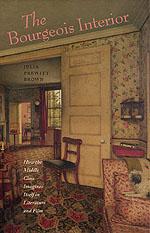
ISBN: 1283806029 0813934281 9780813934280 9780813927107 0813927102 9781283806022 Year: 2008 Publisher: Charlottesville University of Virginia Press
Abstract | Keywords | Export | Availability | Bookmark
 Loading...
Loading...Choose an application
- Reference Manager
- EndNote
- RefWorks (Direct export to RefWorks)
Brown examines the ambivalence of economically determined objects both as repositories of memory and dreams and as fetishized commodities that become detached from everyday reality. Does the bourgeois possess the interior and its objects, or do the interior and its objects possess the bourgeois?.
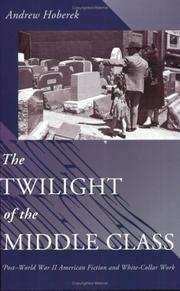
ISBN: 9786612158414 1400826810 1282158414 0691121451 9781400826810 069112146X 9780691121451 9780691121468 6612158417 9781282158412 Year: 2009 Publisher: Princeton, NJ
Abstract | Keywords | Export | Availability | Bookmark
 Loading...
Loading...Choose an application
- Reference Manager
- EndNote
- RefWorks (Direct export to RefWorks)
In The Twilight of the Middle Class, Andrew Hoberek challenges the commonly held notion that post-World War II American fiction eschewed the economic for the psychological or the spiritual. Reading works by Ayn Rand, Ralph Ellison, Saul Bellow, Phillip Roth, Flannery O'Connor, Thomas Pynchon, Don DeLillo, and others, he shows how both the form and content of postwar fiction responded to the transformation of the American middle class from small property owners to white-collar employees. In the process, he produces "compelling new accounts of identity politics and postmodernism that will be of interest to anyone who reads or teaches contemporary fiction. Hoberek argues that despite the financial gains and job security enjoyed by the postwar middle class, the transition to white-collar employment paved the way for its current precarious state in a country marked by increasingly deep class divisions. Postwar fiction provided the middle class with various imaginative substitutes for its former property-owning independence, substitutes that since then have not only allowed but abetted this class's downward mobility. To read this fiction in the light of the middle-class experience is thus not only to restore the severed connections between literary and economic "history in the second half of the twentieth "century, but to explore the roots of the contemporary crisis of the middle class.
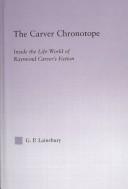
ISBN: 020349802X 9780203498026 9780415966337 0415966337 0415966337 9781135888275 9781135888312 9781135888329 9780415803489 0203605128 1280019735 0415803489 Year: 2004 Publisher: New York Routledge
Abstract | Keywords | Export | Availability | Bookmark
 Loading...
Loading...Choose an application
- Reference Manager
- EndNote
- RefWorks (Direct export to RefWorks)
Raymond Carver's fiction is widely known for its careful documentation of lower-middle-class North America in the 1970s and 80s. Building upon the realist understanding of Carver's work, Raymond Carver's Chronotope uses a central concept of Bakhtin's novelistics to formulate a new context for understanding the celebrated author's minimalist fiction. G. P. Lainsbury describes the critical reception of Carver's work and stakes out his own intellectual and imaginative territory by arguing that Carver's fiction can be understood as diffuse, fragmentary, and randomly ordered. Offering a fresh analy
Book
ISBN: 1611495822 1611495814 1611495830 9781611495829 9781611495829 9781611495812 Year: 2015 Publisher: Newark
Abstract | Keywords | Export | Availability | Bookmark
 Loading...
Loading...Choose an application
- Reference Manager
- EndNote
- RefWorks (Direct export to RefWorks)
The Other Rise of the Novel relies on new research concerning the relevance of bourgeois values and ideals in the early modern period in France to question the extent to which characters in works of fiction portray the rise of individualistic and self-interested behavior. It argues that novels like Manon Lescaut, Lettres d'une Péruvienne, and La Nouvelle Héloïse produce their own alternative economies, different articulations of how individuals should define their relations to others.
French fiction --- Social classes in literature. --- Middle class in literature. --- Literature and society --- History and criticism. --- History --- Literature --- Literature and sociology --- Society and literature --- Sociology and literature --- Sociolinguistics --- Middle classes in literature --- Social aspects
Book
ISBN: 1399507729 1399507737 1399507702 Year: 2023 Publisher: Edinburgh : Edinburgh University Press,
Abstract | Keywords | Export | Availability | Bookmark
 Loading...
Loading...Choose an application
- Reference Manager
- EndNote
- RefWorks (Direct export to RefWorks)
Bringing together historical, literary and sociological theory, this study recaptures the Victorians' broad sense of epistemological uncertainty about their rapidly changing society, reconstructs novelists' specific attempts to legitimate their traditionally low-status genre and offers fresh readings of novels by Charlotte Brontë, Wilkie Collins, Charles Dickens, George Eliot, Elizabeth Gaskell, William North, Anthony Trollope, William Makepeace Thackeray and Charlotte Yonge, among others.
English fiction --- Middle class in literature. --- Middle class --- Social status in literature. --- LITERARY CRITICISM / European / English, Irish, Scottish, Welsh. --- Bourgeoisie --- Commons (Social order) --- Middle classes --- Social classes --- Middle classes in literature --- History and criticism. --- History --- Social conditions
Book
ISBN: 0813933420 9780813933429 9780813933412 0813933412 1283960206 Year: 2013 Publisher: Charlottesville : University of Virginia Press,
Abstract | Keywords | Export | Availability | Bookmark
 Loading...
Loading...Choose an application
- Reference Manager
- EndNote
- RefWorks (Direct export to RefWorks)
Thus, the late eighteenth century proves to be a watershed moment in home's conceptual life, one that produced a remarkably rich and complex set of cultural ideas and images. A 2014 CHOICE Outstanding Academic Title.
Literature and society --- English literature --- Poverty --- Social structure --- Nationalism in literature. --- Middle class in literature. --- English fiction --- Home in literature. --- Literature --- Literature and sociology --- Society and literature --- Sociology and literature --- Sociolinguistics --- Destitution --- Wealth --- Basic needs --- Begging --- Poor --- Subsistence economy --- Organization, Social --- Social organization --- Anthropology --- Sociology --- Social institutions --- Middle classes in literature --- History --- Scottish authors --- History and criticism. --- Government policy --- Social aspects
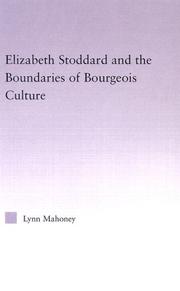
ISBN: 1135883416 1135883424 1280050470 0203484053 9780203484050 0415968348 9781135883379 9781135883416 9781135883423 9780415968348 0203605721 Year: 2004 Publisher: New York : Routledge,
Abstract | Keywords | Export | Availability | Bookmark
 Loading...
Loading...Choose an application
- Reference Manager
- EndNote
- RefWorks (Direct export to RefWorks)
First published in 2004. Routledge is an imprint of Taylor & Francis, an informa company.
Literature and society --- Women and literature --- Social classes --- Middle class in literature. --- Sex role in literature. --- Middle classes in literature --- Class distinction --- Classes, Social --- Rank --- Caste --- Estates (Social orders) --- Social status --- Class consciousness --- Classism --- Social stratification --- History --- Stoddard, Elizabeth, --- Stoddard, Elizabeth Drew (Barstow), --- Barstow, Elizabeth Drew, --- Criticism and interpretation. --- New England --- Intellectual life
Book
ISBN: 178744676X 1640140646 Year: 2020 Publisher: Rochester, NY : Camden House,
Abstract | Keywords | Export | Availability | Bookmark
 Loading...
Loading...Choose an application
- Reference Manager
- EndNote
- RefWorks (Direct export to RefWorks)
Analyzes the transformation of German-language pastoral from a portrayal of the idyllic lives of herdsmen into a vehicle for the concerns and aspirations of the middle class.
German literature --- Pastoral literature, German --- Middle class in literature. --- Country life in literature. --- Middle classes in literature --- Young Germany --- German pastoral literature --- History and criticism. --- German authors. --- German culture. --- German-language writing. --- creative middle class. --- cultural transformation. --- literary analysis. --- literary themes. --- literary transformation. --- literature and society. --- middle class. --- pastoral literature. --- pastoral transformation. --- societal aspirations. --- societal changes. --- societal values.
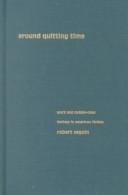
ISBN: 1282903675 9786612903670 0822380811 0822326752 0822326701 Year: 2001 Publisher: Durham [N.C.] : Duke University Press,
Abstract | Keywords | Export | Availability | Bookmark
 Loading...
Loading...Choose an application
- Reference Manager
- EndNote
- RefWorks (Direct export to RefWorks)
Posits social class as the American political unconscious, showing (in an analysis of 19th and 20th century novels) how class exerts pressure on the American cultural imagination, and claiming that what is desired is ultimately the liberation from work.
American fiction --- Middle class in literature. --- Literature and society --- Class consciousness in literature. --- Working class in literature. --- Social change in literature. --- Fantasy in literature. --- Work in literature. --- Labor and laboring classes in literature --- Middle classes in literature --- History and criticism. --- History
| Listing 1 - 10 of 25 | << page >> |
Sort by
|

 Search
Search Feedback
Feedback About UniCat
About UniCat  Help
Help News
News